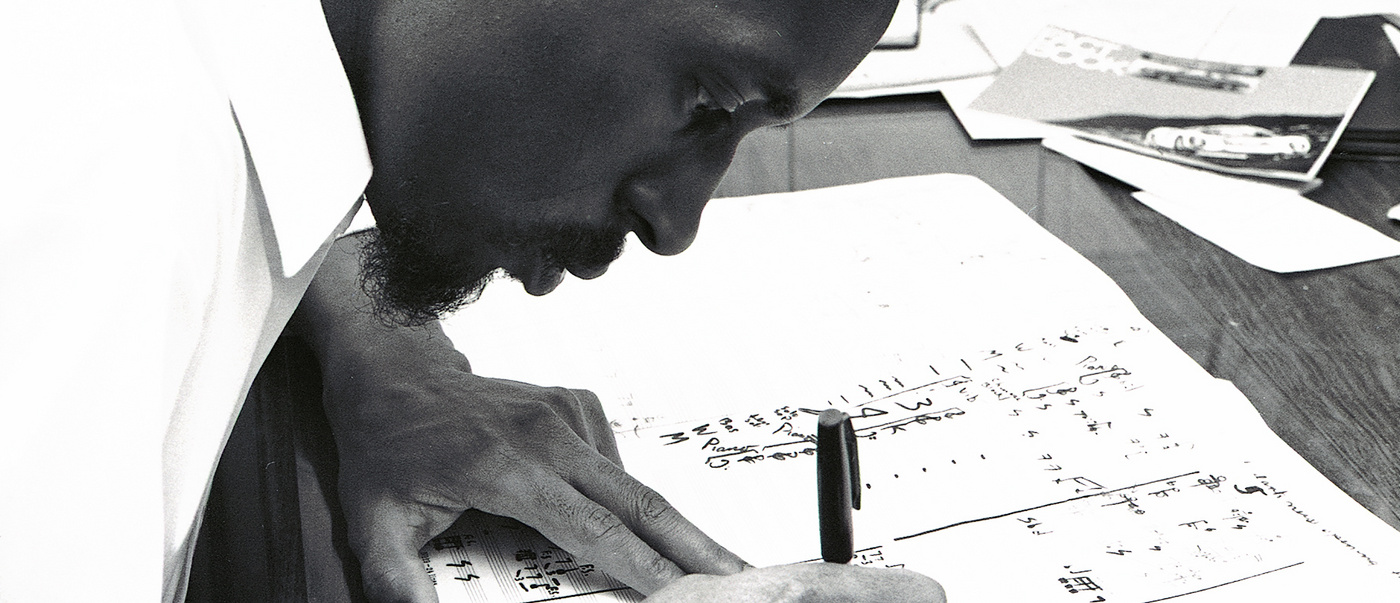Julius Eastman
Concert
Mon, 14. March 2022, 20–21 h

As part of the International Weeks Against Racism
more information

Concerts in the Kunstbau
with the Munich Philharmonic, Münchener Kammerorchester and Kukuruz Quartett
The Lenbachhaus will host several concerts in February and March 2022 featuring works by the US composer Julius Eastman (1940-1990). Eastman was a representative of minimal music and composed primarily for smaller ensembles, including piano quartet. This rarely performed and challenging music is an impressive example of the international and cross-genre movement of Minimalism. The concerts at Lenbachhaus Kunstbau are intended as a musical complement to important works of Minimal Art in the museum's collection by artists such as Dan Flavin, Marcia Hafif, Rosemary Mayer, Robert Morris, Senga Nengudi, Charlotte Posenenske, and Richard Serra. Moreover, individual pieces by Eastman are important early testimonies to the thematization of racism and homophobia in our societies. Already his original work titles confront us with this theme: with Nigger Faggot (1978), Evil Nigger (1979) or Gay Guerrilla (1979), Eastman addresses racist or homophobic themes consciously and directly, in order to leave no one the possibility to escape the reality of these discriminations. Analogous to the titles, Eastman developed an aesthetic-musical correspondence to the structural racisms of his time, which still exist today. The topicality of his compositions is a sad fact in this context, as he brings before our eyes and ears that even decades later we are still far from a language and society free of discrimination. The verbal violence of the work titles is therefore an unconditional part of Eastman's aesthetic work and these must be written out in the context of the performances so as not to jeopardize the integrity of his work and his intentions.
The collection of the Blaue Reiter—a group of artists who championed the equality and mutual enlightenment of all the arts—has led to a programmatic focus at Lenbachhaus that combines visual art and music. We have been pursuing this consistently for several years with extraordinary projects. These include the first large-scale installation/performance by the Kraftwerk group in 2011, the Playback Room by Wolfgang Tillmans in 2016, the exhibition Electric Ladyland by Michaela Melián in 2016, the world premiere of Symphony 80 by Ari Benjamin Meyers together with the Bavarian Radio Symphony Orchestra in 2017, the installation White Circle by raster-noton in 2018, and the world premiere of the Prekäres Singspiel Prekärotopia by Beate Engl, Leonie Felle, and Franka Kaßner in 2019. Later in 2022 the sound installation Spatial Jitter by the electro duo Mouse on Mars will follow. Our supporting program is also repeatedly dedicated to musical themes, such as in our collaborations with the Bavarian State Opera.
Curated by Eva Huttenlauch und Matthias Mühling
With the kind support of Förderverein Lenbachhaus e.V.
Short biography of Julius Eastman
Julius Eastman (born 1940 in New York City – died 1990 in Buffalo, New York) was an American composer, pianist and singer. He was a representative of minimal music. From the age of 14 he received piano lessons at Ithaca College. In 1959 he started studying composition and piano at the renowned Curtis Institute of Music in Philadelphia.
After his successful concert debut as a pianist in 1966 at Town Hall in New York City, Eastman moved to Buffalo. There he joined the Center for the Creative and Performing Arts and taught as Assistant Professor of Music at SUNY Buffalo beginning in the early 1970s. During this time, he composed numerous pieces for the S.E.M. Ensemble, which he co-founded, and performing them on several occasions with Czech composer and conductor Petr Kotík. In 1973 Eastman created one of his key works: Stay On It is still considered one of the earliest examples of post-minimalist music that incorporates influences from popular music.
In 1975 Julius Eastman's productive phase in Buffalo came to an end. After a conflict with John Cage, who was already very well-known and influential at the time, Eastman moved to New York. Within a short time, he produced several of his significant minimalist compositions, that carry such provocative titles as Evil Nigger*, Gay Guerrilla, and Crazy Nigger*. These pieces, written in 1978/79, follow what Eastman called the "organic" principle: each section of a composition basically contains all the information of the preceding sections, with logical omissions. In this way he builds serial compositional structures according to the principle of repetition.
Julius Eastman died of cardiac arrest in Buffalo on May 28, 1990, at the age of only 49.
Program:
February 8, 2022, 8 pm
Femenine (1974)
Musicians of the Munich Philharmonic
Piano and direction: Miguel Pérez Iñesta
Program booklet Feb 8 (PDF)
Live stream on Feb 8
March 5, 2022, 8 pm
Prelude to The Holy Presence of Joan d'Arc (1981)
The Holy Presence of Joan d’Arc (1981) (version for string orchestra)
Buddha (1984) (version for string orchestra by Philip Bartels, 2022)
Münchener Kammerorchester
Program booklet March 5 (PDF)
Live stream on March 5
March 11 and 12, 2022, 8 pm each
Fugue no. 7 (1983)
Evil Nigger* (1979)
Gay Guerrilla (1979)
Kukuruz Quartet:
Philip Bartels, piano
Duri Collenberg, piano
Simone Keller, piano
Lukas Rickli, piano
Program booklet March 11 and 12 (PDF)
Live stream on March 11
Additional concert as part of the International Weeks Against Racism on
March 14, 2022, 8 pm
Sofia Jernberg, vocals
Simone Keller, piano
Julia Amanda Perry (1924–1979), Prelude (1962)
Julius Eastman (1940–1990), Prelude to the Holy Presence of Joan d’Arc (1981)
Julius Eastman, Piano 2 (1986)
Sofia Jernberg (*1983), Improvisation (2022)
Arnold Schönberg (1874–1951), Die Kreuze (1912)
Jessie Marino (*1984), Slender Threads (2020)
Julius Eastman, Buddha (1984)
Irene Higginbotham (1918–1988), Good morning heartache (1945)
Program booklet March 14 (PDF)